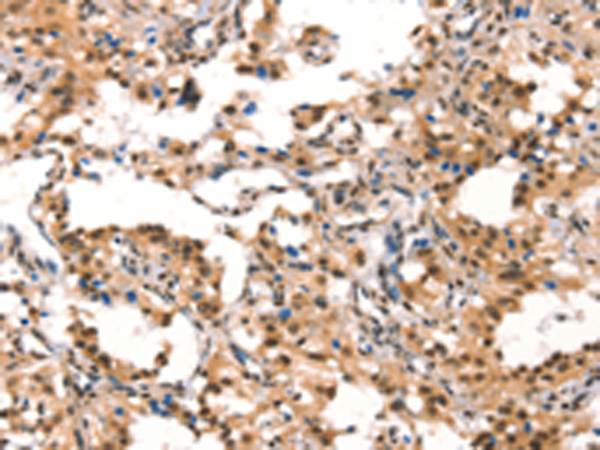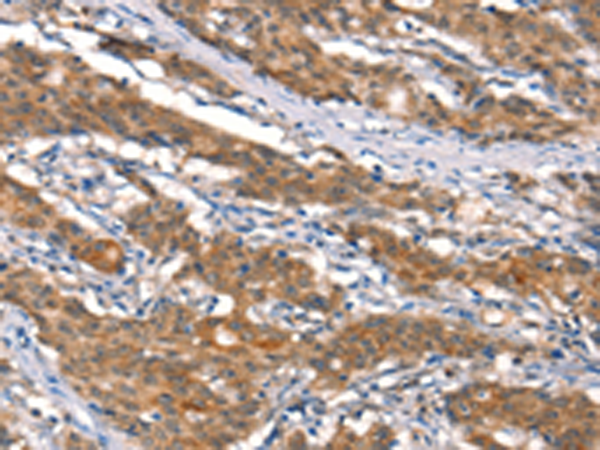

| WB | 咨询技术 | Human,Mouse,Rat |
| IF | 咨询技术 | Human,Mouse,Rat |
| IHC | 1/50-1/200 | Human,Mouse,Rat |
| ICC | 技术咨询 | Human,Mouse,Rat |
| FCM | 咨询技术 | Human,Mouse,Rat |
| Elisa | 1/2000-1/5000 | Human,Mouse,Rat |
| Aliases | SFM2; MRXSC; MRXHF2; MRXS15 |
| Host/Isotype | Rabbit IgG |
| Antibody Type | Primary antibody |
| Storage | Store at 4°C short term. Aliquot and store at -20°C long term. Avoid freeze/thaw cycles. |
| Species Reactivity | Human, Mouse |
| Immunogen | Synthetic peptide of human CUL4B |
| Formulation | Purified antibody in PBS with 0.05% sodium azide and 50% glycerol. |
+ +
以下是关于CUL4B抗体的3篇代表性文献的简要信息:
1. **"Mutations in CUL4B, which encodes a ubiquitin E3 ligase subunit, cause X-linked mental retardation"**
*作者:Tarpey PS, et al. (2007), Nature Genetics*
摘要:该研究首次报道了CUL4B基因突变与X染色体连锁智力障碍的关联,利用CUL4B抗体检测患者细胞中蛋白表达缺失,揭示了CUL4B在神经发育中的关键作用及其泛素连接酶功能异常的影响。
2. **"CUL4B promotes proliferation and inhibits apoptosis of human hepatocellular carcinoma by targeting p53 for degradation"**
*作者:Yang Y, et al. (2015), Cancer Research*
摘要:研究发现CUL4B在肝癌中通过泛素-蛋白酶体系统降解抑癌蛋白p53.促进肿瘤生长。研究使用CUL4B抗体进行Western blot和免疫组化,证实其在肝癌组织中的高表达及临床预后意义。
3. **"CUL4-DDB1 ubiquitin ligase interacts with multiple WD40-repeat proteins and regulates histone methylation"**
*作者:Higa LA, et al. (2006), Genes & Development*
摘要:揭示了CUL4B-DDB1复合体通过招募底物适配蛋白调控组蛋白修饰(如H3K4甲基化),影响基因表达。研究通过CUL4B抗体免疫共沉淀(Co-IP)实验,解析了其在表观遗传调控中的分子机制。
---
*注:文献选取基于功能研究中的抗体应用,如需实验方法学文献或最新研究,建议通过PubMed/Google Scholar检索关键词“CUL4B antibody”+“application/validation”。*
The CUL4B antibody is a research tool used to study the Cullin 4B (CUL4B) protein, a core component of the Cullin-RING E3 ubiquitin ligase complex (CRL4B). CUL4B, encoded by the *CUL4B* gene on the X chromosome, functions as a scaffold protein that assembles with DDB1. ROC1. and substrate receptors to mediate substrate-specific ubiquitination. This post-translational modification regulates diverse cellular processes, including DNA repair, chromatin remodeling, cell cycle progression, and transcriptional regulation. Dysregulation of CUL4B has been linked to X-linked intellectual disability syndromes (e.g., Cabezas syndrome) and cancers, where its overexpression may promote tumorigenesis by destabilizing tumor suppressors or cell cycle inhibitors.
CUL4B antibodies are essential for detecting protein expression, localization, and interactions in experimental techniques like Western blotting, immunohistochemistry, and immunoprecipitation. They help elucidate CUL4B’s role in disease mechanisms and its interplay with other ubiquitination pathway components. Specificity and validation of these antibodies are critical, as CUL4B shares structural homology with other Cullin family members (e.g., CUL4A). Research using CUL4B antibodies has advanced understanding of its dual roles in neurodevelopment and cancer, highlighting potential therapeutic targets. However, challenges remain in distinguishing isoform-specific functions and developing clinical applications.
×